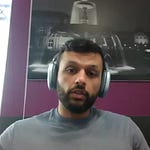It’s not about the legal definition. It’s about Western and Jewish exceptionalism
Our call this week will be at our regular time, Friday, December 20 at 1 PM. Our guests will be Mahmoud Muna, Juliette Touma, and Matthew Teller, editors of the new anthology, Daybreak in Gaza: Stories of Palestinian Lives and Culture, which includes close to a hundred stories about the lives of people in Gaza, both before and after its recent destruction. This interview will be co-sponsored with Jewish Currents.
I’ve also recorded a Zoom interview (without a live audience) with the Palestinian-Norwegian writer Iyad el-Baghdadi, whose commentary on Middle East politics I always find fascinating, about the regional implications of the Assad regime’s fall in Syria and Israel’s military intervention there. Here’s a brief thread he wrote on the subject. We’ll send out that interview to paid subscribers on Monday.
Ask Me Anything
Once a month I host an “Ask Me Anything” session for Premium Members. Our next will one will be this coming Wednesday, December 18, at 1 PM.
If you’re interested in becoming a regular or premium member, please hit the “Subscribe” button or send me an email.
Sources Cited in this Video
Amnesty International’s report on genocide in Gaza.
The Trump administration’s rationale for accusing China of genocide.
Former Israeli defense minister Moshe “Bogie” Yaalon accuses Israel of ethnic cleansing in northern Gaza.
If you’re a medical worker in Gaza, you’re more likely than the average Gazan to be killed or detained.
According to the UN, Israel has killed more aid workers in Gaza than in any prior crisis.
Adam Shatz’s remarkable interview on the London Review of Books podcast with Muhammad Shehada and Dr. Ghassan Abu-Sitta.
Things to Read
(Maybe this should be obvious, but I link to articles and videos I find provocative and significant, not necessarily ones I entirely agree with.)
In Jewish Currents (subscribe!), I wrote about Bernard-Henri Lévy’s surreal new book, Israel Alone.
A year after an Israeli airstrike killed the Palestinian poet, teacher and writer Refaat Alareer, a book of his writing, entitled If I Must Die, has been published posthumously.
The head of Amnesty International Israel explains why he resigned.
For the Foundation for Middle East Peace’s “Occupied Thoughts” podcast, I interviewed the writer William Shoki about why the Palestinian struggle resonates so deeply in South Africa.
See you on Friday,
Peter
VIDEO TRANSCRIPT:
I want to say something about this debate about whether what Israel is doing in Gaza constitutes a genocide—a debate that’s been reignited by Amnesty International’s recent report calling what Israel is doing a genocide. I think that over time it will become less and less controversial to say that what Israel is doing is a genocide. In the technical definition of that, which means ‘an effort to destroy a people in whole or in part,’ it’s worth remembering that genocide—at least as I understand it—does not mean that you have to kill everybody or even try to kill everybody.
So, for instance, the United States government has said that China is committing a genocide against the Uyghurs in Xinjiang, but nobody is claiming that China has killed all the Uyghurs or is trying to kill all the Uyghurs or even most of them. In fact, a big part of the US claim of genocide is the Chinese use of forced birth control against the Uyghurs. And another part of it is that China didn’t allow Uyghurs to transmit their culture to their children. So, the idea of ‘destroy’ doesn’t necessarily mean kill. It can mean that you’re destroying a people kind of culturally or nationally by not allowing them to transmit their culture, their national identity.
So again, by that standard, I don’t think it’s going to turn out to be that controversial that what Israel is doing in Gaza is a genocide when you think about the fact that Israel has really destroyed almost all of the basis for life in Gaza, destroyed most of the homes, destroyed or damaged most of the hospitals, the universities, the agriculture. You’ve taken a place that was considered unlivable by the United Nations before October 7th, and you’ve made it just catastrophically unlivable for people.
And this is in a context in which Israel is not offering any vision of Gaza’s redevelopment. Israel has no plan that it’s put forward saying once Hamas is no longer there, these people are going to rule, Gaza is going to be brought back to life. To the contrary, Israel is—according to even former Defense Minister Bogie Yaalon—ethnically cleansing northern Gaza; more and more evidence that there are going to be settlements there; the blockade of Gaza is going to be even fiercer than it was; and that Israel is going to have military roads going all the way through Gaza. So, Gaza is going to be divided up into little cantons in which an incredibly overcrowded area is going to have less land and fewer resources to sustain life.
There was a report that said that if Gaza returned to the GDP it had on October 6th, to the growth rate it had on October 6th, 2023, it would regain the GDP that it had the day before October 7th in like 80 years. So, it would take a massive, massive effort at reconstruction to make Gaza remotely livable. And all of Israel’s actions suggest it’s doing exactly the opposite, which suggests that its desire is to maintain this pressure on people in Gaza in hopes many of them will leave maybe if Gaza opens the border, or to confine them to a smaller area, or just to see a significant number of them die so that the population is no longer as big a threat to Israel.
So again, if you think about the genocide, the way we use the term vis-a-vis the Uyghurs—which wasn’t very controversial, by the way, I didn’t see a lot of Americans saying, wait a second, you’re defining that term down, you’re defining it too loosely, right—it will turn out, I think, that more and more people agree that this constitutes a genocide in Gaza and it will have followed a kind of familiar pattern. Which is that very frequently it’s Palestinians who first use these terms. But Palestinians don’t have much of a voice in kind of Western media discourse. But then, gradually over time, you find kind of Western progressives like these human rights organizations pick it up, and then it tends to filter a little bit more into the mainstream. It’s a worthwhile reminder of just the importance of listening to Palestinians in the first place, you know. Not because Palestinians are inherently smarter than anybody else, but just because Palestinians tend to have a better understanding of what’s actually happening on the ground because they are closer to it.
I was just listening to this excellent podcast discussion on the London Review of Books where Adam Shatz is interviewing my friend Muhammad Shehada and the Palestinian doctor, Ghassan Abu-Sitta. And just listen to that podcast. It conveys so much more information about what life is actually like in Gaza than your average conversation between two American commentators or American Jewish commentators. You’re just so much more distant from the situation on the ground that it’s not surprising that the assessments that Palestinians make often tend to get ratified later on by others and understandable that Palestinians kind of are annoyed that people don’t listen to them in the first place.
I think that the reason that Israel supporters are so upset about the term of genocide is not because they mostly have a specific critique of the particular definition and the way it’s being used in this case. But I think it’s something broader. Which is that this debate is following the same pattern that you saw years ago of the term ‘occupation.’ It was a time when it was very, very controversial in pro-American Jewish circles to even use the term occupation. Then you saw this debate over ‘apartheid,’ ‘settler colonial.’ I think the anger at these words, the pushback, doesn’t have to do with the specific meanings. Each of these words have very specific meanings that one could potentially quibble about. I think the reason that people get so upset about these terms is because they just signify something very bad, right. If you use a term like apartheid, settler colonial, genocide, even occupation, what it suggests to people is just like this government is doing something really, really terrible, the kind of things that the worst governments in the world do.
And so, I think the pushback is really about a kind of Western and Jewish exceptionalism, which is to say, it’s really important for Israel’s defenders to kind of maintain the idea that a Jewish state, even though it’s imperfect, doesn’t do the kinds of things that the worst governments in the world do, which are usually framed as America’s adversaries: China, Russia, Iran, Venezuela, etc., right. And I think that’s partly because the organized American Jewish community is very invested in the notion that, you know, that Jews essentially play the role of victims and not the role of victimizers, and that basically our historical national role is maybe not even to be able to do the worst kind of things that human beings do.
This was something that really came through to me when I was reviewing Bernard-Henri Lévy’s book where he basically has these crazy statements where he basically just says, essentially, I’m paraphrasing, the Jewish way is to be just. I was like, really? We’re in some different category of human beings, right? But I also think there’s an element of Western exceptionalism where the United States is very invested in the idea that the worst crimes are only committed by America’s adversaries, or at least by countries that America doesn’t have a strong relationship with. Whereas America’s allies, even if they make mistakes, can never be that bad, can never be as bad as America’s adversaries, that Israel could never be doing something which is as bad as what China or Russia or Iran or Venezuela does. This is part of also the purpose of constantly calling Israel a democracy to kind of put it in a different category. Yes, it’s a democracy for Israeli Jews. There’s no question about it. But on its face to call it a democracy for Palestinians when 70% of the Palestinians under Israeli control, those in the West Bank and Gaza and most of those in East Jerusalem are not citizens and don’t have the right to vote for the government that controls their lives.
It’s simply a silly statement, right. But I think it’s part of this effort to kind of say, no, no, Israel is a Western country and therefore in a different moral category. And I think it’s really important to challenge this Western exceptionalism, the same Western exceptionalism which underlies the idea that the International Criminal Court should never go after America or America’s allies, but only America’s adversaries or countries that America doesn’t have an allied relationship with. This Western exceptionalism is part of what creates so much anger and cynicism and resentment around the world. And it’s also extremely dangerous because it suggests that there are different categories of human beings, some of whom because they are non-Western, are capable of grave crimes and others, because they’re Western, are somehow immune from that. That’s a very dangerous form of supremacy.
The truth is that all human beings are fallible. All human beings and all countries are capable of terrible, terrible crimes. And the way to prevent those crimes is precisely to recognize that those societies are capable of those things and therefore not to give them impunity, right, to not give them a pass when it comes to international law. Which is exactly what Israel’s defenders want it to do in this case. And that’s why I think that these terms do really have significance beyond their particular details because it’s important to insist that there is nothing about being a Western state or being a Jewish state that means that you are immune from these terrible, terrible behaviors. And the more you say that you are immune, in fact, the greater risk you are of doing precisely these terrible kinds of crimes.








